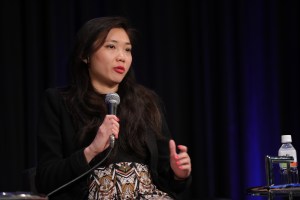Female VCs target the startup status quo at NEST 2017

All too often, women are underrepresented in discussions about tech startups, innovation and venture capital. According to the 2016 CrunchBase Women in Venture report, only 7% of partners at 100 leading venture firms were women. Meanwhile, Silicon Valley Bank reported that in a 2016 survey of U.S. technology and healthcare startup executives, 70% had no women on the board of directors, and 54% had no women in executive positions, up from 66% and 46%, respectively, in 2016.

Challenging the status quo
Representation was one of many issues that female venture capitalists (VCs) discussed at the recent New Economy Summit (NEST) 2017 in Tokyo. Ernestine Fu, a venture partner at California-based Alsop Louie Partners, noted that Silicon Valley has a strong bias whereby recruiters’s judgments are skewed by their knowledge of the kind of people who have been successful entrepreneurs in the past – many of whom happen to be white men.
“One of the biggest challenges is because there’s this pattern-matching behavior, we naturally go to conformity as opposed to thinking about how can people with different backgrounds help grow startups,” said Fu, who manages a portfolio of companies in sectors such as data storage, payments and mobile analytics.

This bias disadvantages anyone who doesn’t happen to look like the most famous examples of startup success – a Sergey Brin or a Mark Zuckerberg, for example – Fu argues.
Grace Sai, CEO and co-founder of Impact Hub Singapore, said she tends not to like discussions that contrast women and men. “I’m not such a fan of this male versus female thing,” she said. “But what I think is important are female-like characteristics, whether it’s empathy, compassion or deep listening skills.”
“My message is that if there are female role models out there, they should be proud to stand out because nothing breeds success like success does,” continued Sai, who is also managing partner at Hub Ventures Fund, a startup accelerator and seed fund. “Stand up, rise up and share your story.”
Rachel Lau, co-founder of Malaysia-based RHL Ventures, said she had experienced no difficulties but, in contrast, plenty of benefits when working with men. Still, she warned women against passivity.
“If you let people discriminate against you, you’ll get discrimination,” said Lau, who works with three male partners at RHL. “If a white male says ‘Oh you’re so young and cute, you shouldn’t be so aggressive,’ I tell him, ‘You’re cute too. I’m just going to ignore you now.’”

Keep failing to win
Aside from dealing with stereotypes, the panelists addressed the importance of accepting failure, and normalizing it in cultures where it’s not tolerated.
Long before she became a VC, Lau was a competitive gymnast, and she was always reminded that there can only be three medal winners.
“As a competitive athlete, you’re constantly failing because it’s very hard to be No. 1 and having learned that, you strive to be always good and always win,” said Lau. “The person who wins at the end is the person who’s still there.”
“Failure is OK but quitting is not OK,” echoed Fu, who related her early difficulties in getting an internship.
“Asia is a culture that doesn’t like failure, a culture that wants us all to be perfect, but innovation means trying things that don’t work,” said Sai, whose Impact Hub hosts popular storytelling events in which entrepreneurs relate their failures. “If you find yourself in an environment where failure is not tolerated, then you have to find your own path.”
Read more reports on NEST 2017 here.





